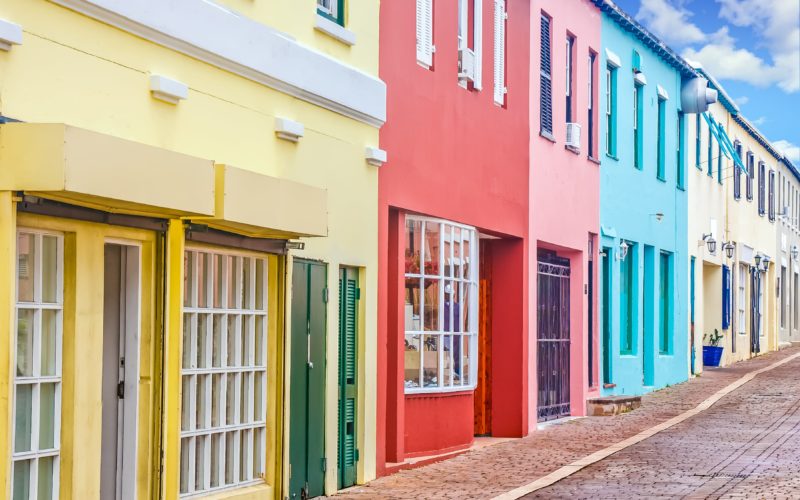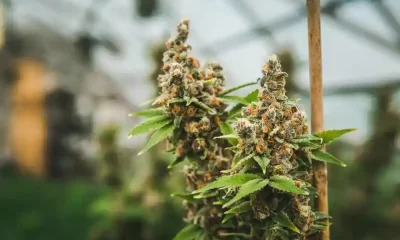Government
United Kingdom Blocks Bermuda Territory from Legalizing Cannabis

The United Kingdom has prevented Bermuda from following through with its cannabis legalization bill.
The Royal Gazette stated that on Sept. 6, Bermuda Governor and Commander-in-Chief Rena Lalgie was “instructed” by United Kingdom Foreign Secretary to refuse to give royal assent to the Cannabis Licensing Bill. “The Secretary of State for Foreign, Commonwealth and Development Affairs concluded that the Bill, as currently drafted, is not consistent with obligations held by the UK and Bermuda under the 1961 Single Convention on Narcotic Drugs and the 1971 Convention on Psychotropic Substances. I have informed the Premier and relayed the UK’s continued desire to work with Bermuda on reforms within the scope of our existing international obligations,” Lalgie said.
According to the U.K. Parliament, royal assent is final approval for a bill to become law. “Once a bill has completed all the parliamentary stages in both Houses, it is ready to receive royal assent,” the U.K. parliament states.
This news occurred on the same day that Liz Truss became U.K. Prime Minister (PM), replacing former PM Boris Johnson.
Media reports that the denial of approval for Bermuda’s bill has caused tension in relations between the U.K. and Bermuda. Bermuda Attorney General Kathy Lynn Simmons explained that this won’t be the end for cannabis in the country. “Disappointing, but not surprising, given the confines of our constitutional relationship with the UK government and their archaic interpretation of the narcotic conventions,” Simmons said. “The people of Bermuda have democratically expressed their desire for a regulated cannabis licensing regime, following the strong endorsement at the ballot box and an extensive public consultation process. The Government of Bermuda intends to continue to advance this initiative, within the full scope of its constitutional powers, in keeping with our 2020 general election platform commitment.”
The Bermuda House of Assembly approved the Cannabis Licensing Bill in March 2022, which then moved to Gov. Lalgie for royal assent. However, not all legislators were in support of the cannabis bill.
Bermuda has two political parties: the One Bermuda Alliance and the Progressive Labour Party (PLP). One Bermuda Alliance’s Shadow Home Affairs Minister, Scott Pearman describes the bill as “deeply flawed.” In April, he said that there was a “high likelihood” that Lalgie wouldn’t grant royal assent and the bill would not become law. Pearman explained that the bill was a flagship initiative of current Premier Edward Burt, who is also the leader of the PLP, and “almost half of his PLP MPs did not vote for the Bill.”
“It was deeply flawed—no matter what position you hold on the cannabis debate, this particular Bill was not for you. The Premier has been well aware of the U.K.’s treaty obligations throughout,” Pearman continued. “His own attorney-general pointed out the U.K.’s treaty obligations in parliament when the Bill was debated the first time in February 2021. The premier then stated publicly in November 2021 that he had no intention of tailoring his Bill to satisfy the U.K.’s conventions obligations. So, it was [PM Edward] David Burt’s choice to steam ahead as he did, rather than seek consensus and compromise. It should come as no surprise to anyone that royal assent has not been granted on this Bill. And it should certainly not surprise Premier Burt.”
Current Bermuda law states that no criminal offenses would be issued if a person carries seven grams of cannabis or less, as directed by The Misuse of Drugs (Decriminalization of Cannabis) Amendment Act of 2017. However, the act does not make it legal to “consume, cultivate, traffic or import cannabis in any quantity.”
Source: https://hightimes.com/news/united-kingdom-blocks-bermuda-territory-from-legalizing-cannabis/
Business
New Mexico cannabis operator fined, loses license for alleged BioTrack fraud

New Mexico regulators fined a cannabis operator nearly $300,000 and revoked its license after the company allegedly created fake reports in the state’s traceability software.
The New Mexico Cannabis Control Division (CCD) accused marijuana manufacturer and retailer Golden Roots of 11 violations, according to Albuquerque Business First.
Golden Roots operates the The Cannabis Revolution Dispensary.
The majority of the violations are related to the Albuquerque company’s improper use of BioTrack, which has been New Mexico’s track-and-trace vendor since 2015.
The CCD alleges Golden Roots reported marijuana production only two months after it had received its vertically integrated license, according to Albuquerque Business First.
Because cannabis takes longer than two months to be cultivated, the CCD was suspicious of the report.
After inspecting the company’s premises, the CCD alleged Golden Roots reported cultivation, transportation and sales in BioTrack but wasn’t able to provide officers who inspected the site evidence that the operator was cultivating cannabis.
In April, the CCD revoked Golden Roots’ license and issued a $10,000 fine, according to the news outlet.
The company requested a hearing, which the regulator scheduled for Sept. 1.
At the hearing, the CCD testified that the company’s dried-cannabis weights in BioTrack were suspicious because they didn’t seem to accurately reflect how much weight marijuana loses as it dries.
Company employees also poorly accounted for why they were making adjustments in the system of up to 24 pounds of cannabis, making comments such as “bad” or “mistake” in the software, Albuquerque Business First reported.
Golden Roots was fined $298,972.05 – the amount regulators allege the company made selling products that weren’t properly accounted for in BioTrack.
The CCD has been cracking down on cannabis operators accused of selling products procured from out-of-state or not grown legally:
- Regulators alleged in August that Albuquerque dispensary Sawmill Sweet Leaf sold out-of-state products and didn’t have a license for extraction.
- Paradise Exotics Distro lost its license in July after regulators alleged the company sold products made in California.
Golden Roots was the first alleged rulebreaker in New Mexico to be asked to pay a large fine.
Source: https://mjbizdaily.com/new-mexico-cannabis-operator-fined-loses-license-for-alleged-biotrack-fraud/
Business
Marijuana companies suing US attorney general in federal prohibition challenge

Four marijuana companies, including a multistate operator, have filed a lawsuit against U.S. Attorney General Merrick Garland in which they allege the federal MJ prohibition under the Controlled Substances Act is no longer constitutional.
According to the complaint, filed Thursday in U.S. District Court in Massachusetts, retailer Canna Provisions, Treevit delivery service CEO Gyasi Sellers, cultivator Wiseacre Farm and MSO Verano Holdings Corp. are all harmed by “the federal government’s unconstitutional ban on cultivating, manufacturing, distributing, or possessing intrastate marijuana.”
Verano is headquartered in Chicago but has operations in Massachusetts; the other three operators are based in Massachusetts.
The lawsuit seeks a ruling that the “Controlled Substances Act is unconstitutional as applied to the intrastate cultivation, manufacture, possession, and distribution of marijuana pursuant to state law.”
The companies want the case to go before the U.S. Supreme Court.
They hired prominent law firm Boies Schiller Flexner to represent them.
The New York-based firm’s principal is David Boies, whose former clients include Microsoft, former presidential candidate Al Gore and Elizabeth Holmes’ disgraced startup Theranos.
Similar challenges to the federal Controlled Substances Act (CSA) have failed.
One such challenge led to a landmark Supreme Court decision in 2005.
In Gonzalez vs. Raich, the highest court in the United States ruled in a 6-3 decision that the commerce clause of the U.S. Constitution gave Congress the power to outlaw marijuana federally, even though state laws allow the cultivation and sale of cannabis.
In the 18 years since that ruling, 23 states and the District of Columbia have legalized adult-use marijuana and the federal government has allowed a multibillion-dollar cannabis industry to thrive.
Since both Congress and the U.S. Department of Justice, currently headed by Garland, have declined to intervene in state-licensed marijuana markets, the key facts that led to the Supreme Court’s 2005 ruling “no longer apply,” Boies said in a statement Thursday.
“The Supreme Court has since made clear that the federal government lacks the authority to regulate purely intrastate commerce,” Boies said.
“Moreover, the facts on which those precedents are based are no longer true.”
Verano President Darren Weiss said in a statement the company is “prepared to bring this case all the way to the Supreme Court in order to align federal law with how Congress has acted for years.”
While the Biden administration’s push to reschedule marijuana would help solve marijuana operators’ federal tax woes, neither rescheduling nor modest Congressional reforms such as the SAFER Banking Act “solve the fundamental issue,” Weiss added.
“The application of the CSA to lawful state-run cannabis business is an unconstitutional overreach on state sovereignty that has led to decades of harm, failed businesses, lost jobs, and unsafe working conditions.”
Business
Alabama to make another attempt Dec. 1 to award medical cannabis licenses

Alabama regulators are targeting Dec. 1 to award the first batch of medical cannabis business licenses after the agency’s first two attempts were scrapped because of scoring errors and litigation.
The first licenses will be awarded to individual cultivators, delivery providers, processors, dispensaries and state testing labs, according to the Alabama Medical Cannabis Commission (AMCC).
Then, on Dec. 12, the AMCC will award licenses for vertically integrated operations, a designation set primarily for multistate operators.
Licenses are expected to be handed out 28 days after they have been awarded, so MMJ production could begin in early January, according to the Alabama Daily News.
That means MMJ products could be available for patients around early March, an AMCC spokesperson told the media outlet.
Regulators initially awarded 21 business licenses in June, only to void them after applicants alleged inconsistencies with how the applications were scored.
Then, in August, the state awarded 24 different licenses – 19 went to June recipients – only to reverse themselves again and scratch those licenses after spurned applicants filed lawsuits.
A state judge dismissed a lawsuit filed by Chicago-based MSO Verano Holdings Corp., but another lawsuit is pending.
Source: https://mjbizdaily.com/alabama-plans-to-award-medical-cannabis-licenses-dec-1/
-

 Business2 years ago
Business2 years agoPot Odor Does Not Justify Probable Cause for Vehicle Searches, Minnesota Court Affirms
-

 Business2 years ago
Business2 years agoNew Mexico cannabis operator fined, loses license for alleged BioTrack fraud
-

 Business2 years ago
Business2 years agoAlabama to make another attempt Dec. 1 to award medical cannabis licenses
-

 Business2 years ago
Business2 years agoWashington State Pays Out $9.4 Million in Refunds Relating to Drug Convictions
-

 Business2 years ago
Business2 years agoMarijuana companies suing US attorney general in federal prohibition challenge
-

 Business2 years ago
Business2 years agoLegal Marijuana Handed A Nothing Burger From NY State
-

 Business2 years ago
Business2 years agoCan Cannabis Help Seasonal Depression
-

 Blogs2 years ago
Blogs2 years agoCannabis Art Is Flourishing On Etsy













